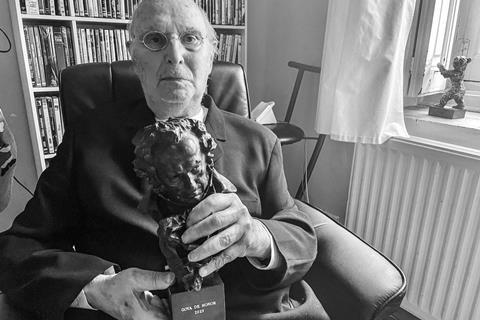
The Berlin film festival honoured the legacy of legendary Spanish filmmaker Carlos Saura, who died aged 91 earlier this month, with a special screening of his last film, documentary Walls Can Talk yesterday (Feb 20).
The attendees included Berlinale’s director Carlo Chatrian, the president of the European Film Academy and Polish director Agnieszka Holland and German directors Wim Wenders and Volker Schlöndorff.
Chatrian said the festival wanted to honour his contribution to cinema and also the special link he had with the Berlinale where he premiered The Hunt (1966), winner of the Silver Bear for best director, and Golden Bear winner Deprisa, deprisa in 1981.
Holland honoured his energy and dedication to cinema until the very end as well as his perseverance working under the constant repression of Franco’s dictatorship. She praised “his relentless gaze” on topics such as “the corruption of the bourgeoisie, juvenile delinquency, flamenco” as well as “being the chronicler of the effects of the Spanish civil war and the dictatorship.” She added: “Whether investigating Goya or [flamenco dancer Antonio] Gades his eye was always true, his integrity unfailing and sheer compassion for humanity was always present in what has become the definition of all that is great in Spanish cinema, European and world cinema.”
Schlöndorff remembered their friendship and the many times they met throughout their careers and Wenders recalled meeting Saura at a film shoot when he travelled to Spain when he was very young. “I was nobody, I was a German nobody called Wim, and at lunch break invited me to eat with them. I will never forget his kindness”.
Active until the end, Saura premiered Walls Can Talk last year, a documentary about art as an ancestral need, linking images from 30.000 year-old Palaeolithic cave paintings to contemporary graffiti, and featuring interviews with painter Miquel Barceló, graffiti artist Suso33 and palaeontologist Juan Luis Arsuaga.
Talking about the film, his son Antonio Saura, head of Latido Films, said: “It was never intended to be a testament, but I think that when you see it you’ll see how he is saying that’s why I do art.” Saura’s anti-war short Rosa, Rosae, made during Covid lockdown, was also shown during the homage.
Born in Huesca in 1932, Saura made his first feature, Los golfos, in 1960. It premiered in Cannes as did Cousin Angelica (1974) and Cría Cuervos (1976), both special jury award winners. Other key titles in his extended filmography include Peppermint Frappé (1967), Elisa, My Life (1977), Anna and the Wolves (1973),Mama Turns 100 (1979), Blood Wedding (1981) Carmen (1983) or El amor brujo (1986).


































No comments yet